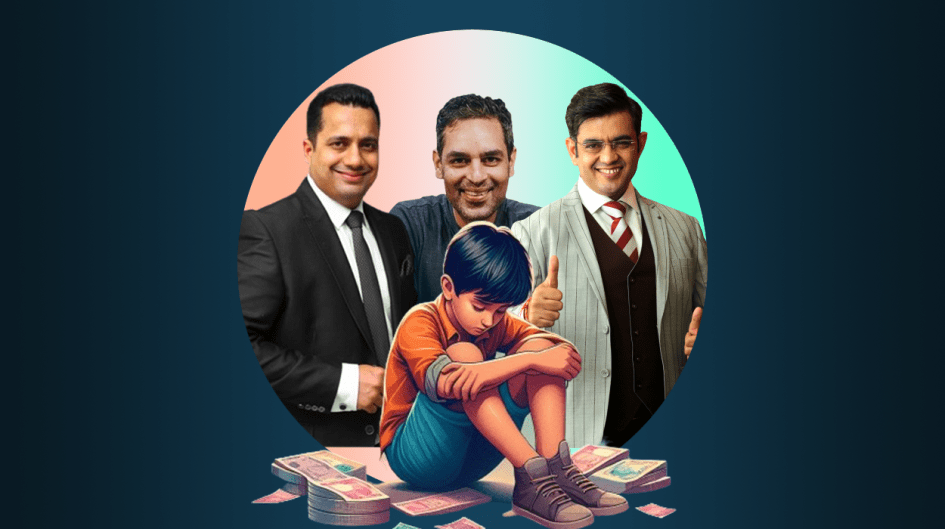Growing up in a middle-class family, my biggest dream has always been to make lots of money and show my parents how grateful I am. I wanted to work hard, stand on my own, and take away all the financial worries they face. This dream isn’t just mine; I think every kid, at some point, wishes they could do the same for their parents.
In our burning quest to achieve this dream, we, as teenagers, often look for shortcuts to wealth, driven by the desire to avoid hard work at an age where the value of perseverance is yet to be fully appreciated. The harsh reality that earning money is a product of relentless effort, demanding every bit of dedication and hard work, doesn’t dawn on us easily. As we navigate through various schemes in search of quick financial gains, instead of committing to the grind, we frequently find ourselves ensnared in scams or caught up in deceptive illusions.
The stock market has emerged as a particularly captivating mirage for many youngsters, more so following the popularity of narratives like the ‘Harshad Mehta’ series, which has undoubtedly added to its allure. Talking about one’s stock investments has become a trendy marker of being in-the-know. However, today’s discussion veers away from the usual chatter about stocks, cryptocurrencies, or MLM schemes. Instead, we’re focusing on how some have crafted a business model that preys on these young aspirants by weaving a narrative filled with enticing terms such as ‘Invest’, ‘Risk hain toh Ishq hain’, ‘Independent’, and ‘Ambani’. These buzzwords are the bait used to construct captivating yet misleading dreams of rapid wealth accumulation. We are going to analyse how these fintech influencers create an illusion over their audience and trick them into selling expensive courses, promoting illegal companies and events, advising sponsored stocks, and a lot more. Let’s break this topic into three sections: Trust, Sell and Repent.
- Trust: In human relationships, trust stands as a complex yet essential component. In the virtual world it becomes much more complex and has a series of decision making to trust someone. Here, without face-to-face conversations and with the understanding that videos are edited and speeches are scripted, our approach to trust formation changes. We instinctively turn to alternative indicators such as visual elements, numbers, and comments to guide our trust in others online. Fintech influencers often spend heavily on advertisements, and even on boosting their online presence through purchased likes and, in some cases, fake followers. They draw attention by showcasing their earnings, luxurious possessions, and lifestyle, alongside sharing their journey in the industry, which typically involves overcoming hardships and achieving success(not gonna lie, it always starts with an emotional struggle and ends with a motivating comeback). Initially, viewers may be impressed by the influencer’s popularity, positive feedback, and authenticity, leading them to subscribe or follow. The content offered, such as tips on time management, generating passive income, and avoiding procrastination, may not be unique but is made appealing through the display of wealth and success stories. Soon, followers might find themselves caught in the influencer’s web, taking their words and advice as gospel truth, regardless of the content’s validity.
“I use emotion for the many and reserve reason for the few.”
– Adolf Hitler
- Sell: After a while, the creator gets to their ‘premium’ content at an ‘affordable’ price which is so ‘exclusive’ that it has been the secret of the ‘millionaires’ from ‘decades’. The emphasised words, marked by single quotes, add weight and boldness to the speech, further ensnaring the viewer in the creator’s trap. Now, you are fully hypnotised and primed to be sold to. For a long time, people have not realised that in the virtual space, the most significant content is the consumer themselves. These creators pinpoint your vulnerabilities, understanding the exact financial hardships your family faces, the challenges you encounter while attending college, the social anxiety of making friends, the pressure to remain relevant in college spaces, and the peer pressure of not being in a relationship. They exploit these vulnerabilities, enticing such students to purchase their courses or enrol in their programs. Some fees can escalate to as much as Rs. 20,000 ( affordable for future millionaires isn’t it?), with promises of teaching business skills, time management, investment strategies, communication strategies, dropshipping and all the necessary skills purportedly required to become a millionaire. These courses are nothing but a sham, they don’t exactly sell courses but sell you dreams which leads to buying their course.
- Repent: Eager to purchase this course, you realise that your household lacks the necessary funds, and you know your parents will outright reject the idea if you ask them. Consequently, your ingenuity leads you to take out loans from Chinese apps that come with exorbitant interest rates, borrow money from friends, or in extreme cases, resort to selling jewellery or stealing money from your own home. Eventually, you manage to acquire the much-anticipated course for 20,000 rupees, which promises to make you a millionaire in just 60 days. You receive a Google Drive link containing all the pre-recorded videos of the course, you discover upon viewing them that the content is identical to what’s already available and bears no relevance to actually becoming a millionaire. Instead of leading you to wealth, the course requires you to work for them, promoting and selling the course for a mere 5-10% commission on your sales. In an attempt to recoup your investment, you begin selling the courses, thereby perpetuating a never-ending cycle. You’ve not only lost your money but are also profiting those who deceived you. This situation raises questions about the nature of such exploitation—what kind of modern-day colonialism is this? This is the moment of regret, you find yourself trapped in significant debt from the loans taken, leading to self-blame and regret over your decisions.
Many of us face challenges as we navigate our paths, striving tirelessly to achieve the dreams we hold dear. However, placing our faith in someone who promises a shortcut to success is misguided. You possess more strength and capability than you might believe. Great men don’t grow overnight , great men grow through what they go through. It’s the journey, with its ups and downs, that we must learn to embrace. The road to success is paved with continuous effort, not quick fixes. Life’s struggles are ongoing, and our aspirations are boundless. Pause for a moment, assess your circumstances, and aim to improve gradually, rather than expecting immediate transformation. To conclude this article, I’m reminded of a quote from a Punjabi folklore of Sindh: “Saari kushiyan miljawan te piche ki reh jaana,” which translates to “What will remain if I gain all my happiness overnight?”



Leave a Reply